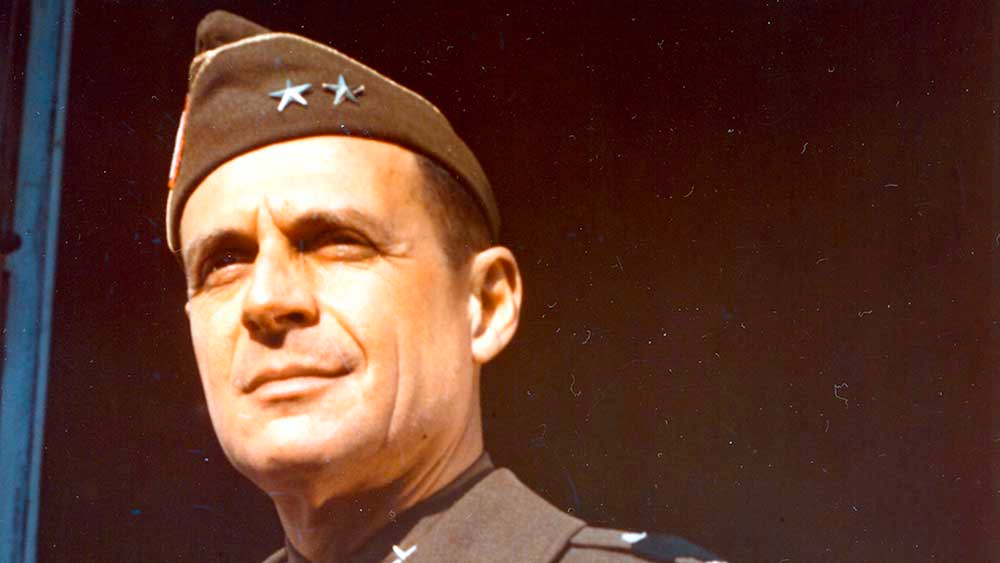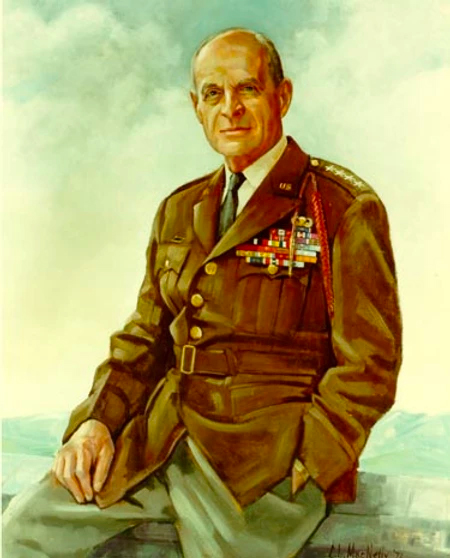Alumni Profile
The English High School Alumnus Who Saved A War and A Country

General Matthew Bunker Ridgway (1895-1992), EHS 1912, West Point 1917, was one of this country’s greatest military commanders. In WW II he served as Supreme Allied Commander in Europe, Chief of Staff of the US Army and was Commanding General of the 82nd Airborne. His greatest victory however was his command of US forces in the Korean War where he not only saved America from defeat but saved a nation.
Below are excerpts written by Victor Davis Hanson which appeared in the Wall Street Journal, July 26, 2013 describing Ridgway’s exploits on the battlefield.
Nearly 37,000 Americans and a half-million South Koreans sacrificed their lives for the chance of a democracy that eventually would make their descendants free and see companies like Hyundai and Samsung enrich the world. Over a half-century later, the most blessed generation in Korea’s history still worries that its capital could be engulfed in flames.
The current crisis should not mislead us into thinking that long ago we could have easily united the Koreas, but instead remind us that by December 1950 the so-called accordion war was considered lost—and a united communist Korea a near certainty.
Seoul exchanged hands five times in less than a year. The war was almost lost in its first few weeks. Only at the 11th hour had the Americans survived a supposed last stand at their toehold in Pusan. Despite racing all the way to the Chinese border after Gen. Douglas MacArthur’s brilliant September 1950 landing at Inchon, by winter of that year the war was again declared almost lost.
More than 200,000 soldiers of Mao Zedong’s People’s Republic of China had crossed the North Korean border in the initial wave. They completely surprised MacArthur’s thinly dispersed troops at the Yalu River. For the next two months the Red Army slowly ground down United Nations forces all the way back to the 38th Parallel.
In the triumphalism after Inchon, America’s military grandees—Omar Bradley, Dwight Eisenhower and George Marshall —had enabled MacArthur’s audacity. But by the end of 1950, with fingers to the wind, they were convinced he was fighting the wrong war at the wrong time against the wrong enemy. From distant Tokyo, MacArthur seemed more interested in shifting blame for the looming American defeat to appeasers back home than in finding a way to salvage victory.

Amid all of this, Gen. Matthew Ridgway arrived near the end of December to take over the broken Eighth Army command of Lt. Gen. Walton Walker, who died in a freak jeep accident on Dec. 23. Ridgway was an unlikely savior. He had never been to Korea or Japan. While he was a genuine World War II hero—a decorated combat leader at the Normandy Landing, the Arnhem Campaign and the Battle of the Bulge—he was now 55. He had suffered a heart attack and was nearing retirement. As an Army deputy chief of staff, Ridgway had strongly opposed his military and civilian superiors who argued that nuclear weapons made conventional wars superfluous.
General Omar Bradley described Ridgway’s work turning the tide of the Korean War as “the greatest feat of personal leadership in the history of the Army.”
The defeatism Ridgway found upon landing in Korea appalled him. American troops were poorly outfitted for the bitter cold. Mail and hot food were infrequent. Gloom infected the officer corps, too many of whom were ensconced far from the front. The “bug out” from the north had turned into the greatest retreat in American military history. Seoul would be lost for a second time days after his arrival. And there were no plans for counteroffensives—only contingencies for regrouping at Pusan or evacuating to Japan.

In the frigid mess, Ridgway sprung into action. He exuded optimism and demanded reassignments for defeatist officers. Food, supplies and mail immediately improved. He published manifestos explaining to the troops why they were fighting their former Asian allies so soon after the defeat of their once-common enemies. Ridgway convinced the Army that they were merely backpedaling, as they regrouped for future counteroffensives from newly hardened lines.
The war, he believed, would soon revert to America’s advantage. If U.N. forces had been strung out far to the North, now the communists were even more extended and poorly supplied. New F-86 Sabrejets had regained air superiority, allowing the lumbering B-29s to devastate vulnerable Chinese logistics.
In a series of integrated offensives—Ridgway called them Roundup, Killer and Ripper—American air and artillery tore apart North Korean and Chinese lines. Ridgway crisscrossed the fluid front. “Old Iron Tits”—a live grenade and medical kit hung from Ridgway’s chest—won the hearts and minds of his soldiers.
By March, with a new American army and a rebuilt South Korean military, Ridgway retook Seoul. Fewer than 100 days after he had arrived in Korea, U.N. forces were at or back across the 38th Parallel. When President Truman removed MacArthur in April 1951, Ridgway assumed theater command and moved to Tokyo. The war that he had saved turned into a stalemate at the DMZ for the next two years.
In his moment of triumph, Ridgway did not choose to retrace MacArthur’s path back north up to the Chinese border. He knew too well that the Pentagon and a fickle public that had initially supported the war, turned on it during Pusan, flipped again after Inchon, and then all but given up after the Chinese crossed the Yalu were not up for another trek to the Chinese border and a nuclear crisis with the Soviet Union.
“Every American soldier,” Gen. Colin Powell summed up at Ridgway’s burial at Arlington Cemetery in 1993, “owes a debt to this great man.”
Like most savior generals, from Themistocles to Gen. David Petraeus, history was not especially kind to the contrarian Ridgway following his brilliant 100 days. General—and then President—Eisenhower had never been fond of his candor. Ridgway was always too unpredictable. Vietnam, he advised Eisenhower and his successors, was a bad idea. Yet when President Lyndon Johnson contemplated leaving in defeat, Ridgway lectured that losing an unwise and unpopular war was even worse than starting one.
At age 90, Ridgway joined President Ronald Reagan at the controversial reconciliation ceremonies with German officers at the Bitburg Cemetery.to widespread criticism. He died at 98, widely admired by officers, but mostly forgotten by the public.
The wonder is not that Korea is still divided, but that there is even a South Korea today—a nation saved only because of the long-ago appearance of a maverick general when there were no others to be found. “Every American soldier,” Gen. Colin Powell summed up at Ridgway’s burial at Arlington Cemetery in 1993, “owes a debt to this great man.” So do millions of South Koreans and Americans.

